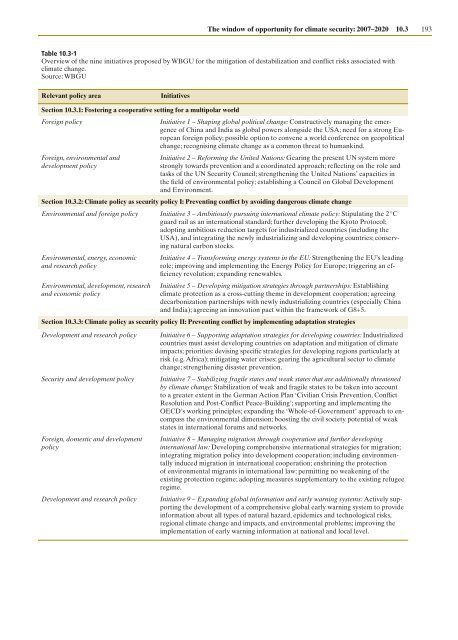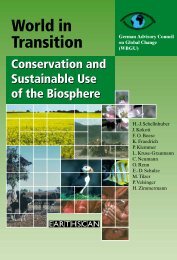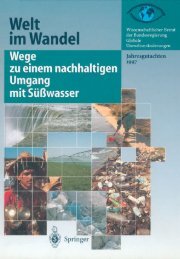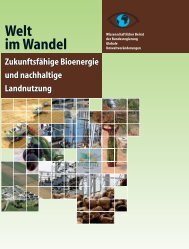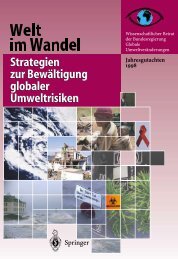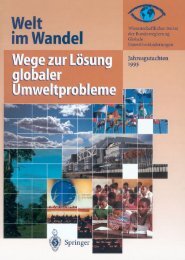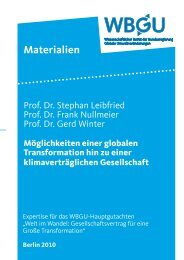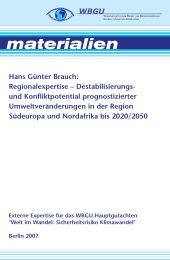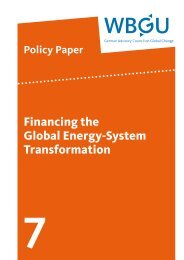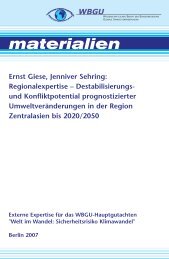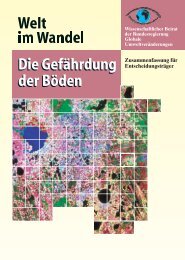World in Transition: Climate Change as a Security Risk - WBGU
World in Transition: Climate Change as a Security Risk - WBGU
World in Transition: Climate Change as a Security Risk - WBGU
Create successful ePaper yourself
Turn your PDF publications into a flip-book with our unique Google optimized e-Paper software.
The w<strong>in</strong>dow of opportunity for climate security: 2007–2020 10.3<br />
Table 10.3-1<br />
Overview of the n<strong>in</strong>e <strong>in</strong>itiatives proposed by <strong>WBGU</strong> for the mitigation of destabilization and conflict risks <strong>as</strong>sociated with<br />
climate change.<br />
Source: <strong>WBGU</strong><br />
Relevant policy area Initiatives<br />
Section 10.3.1: Foster<strong>in</strong>g a cooperative sett<strong>in</strong>g for a multipolar world<br />
Foreign policy Initiative 1 – Shap<strong>in</strong>g global political change: Constructively manag<strong>in</strong>g the emergence<br />
of Ch<strong>in</strong>a and India <strong>as</strong> global powers alongside the USA; need for a strong European<br />
foreign policy; possible option to convene a world conference on geopolitical<br />
change; recognis<strong>in</strong>g climate change <strong>as</strong> a common threat to humank<strong>in</strong>d.<br />
Foreign, environmental and<br />
development policy<br />
Initiative 2 – Reform<strong>in</strong>g the United Nations: Gear<strong>in</strong>g the present UN system more<br />
strongly towards prevention and a coord<strong>in</strong>ated approach; refl ect<strong>in</strong>g on the role and<br />
t<strong>as</strong>ks of the UN <strong>Security</strong> Council; strengthen<strong>in</strong>g the United Nations’ capacities <strong>in</strong><br />
the fi eld of environmental policy; establish<strong>in</strong>g a Council on Global Development<br />
and Environment.<br />
Section 10.3.2: <strong>Climate</strong> policy <strong>as</strong> security policy I: Prevent<strong>in</strong>g confl ict by avoid<strong>in</strong>g dangerous climate change<br />
Environmental and foreign policy Initiative 3 – Ambitiously pursu<strong>in</strong>g <strong>in</strong>ternational climate policy: Stipulat<strong>in</strong>g the 2 °C<br />
guard rail <strong>as</strong> an <strong>in</strong>ternational standard; further develop<strong>in</strong>g the Kyoto Protocol;<br />
adopt<strong>in</strong>g ambitious reduction targets for <strong>in</strong>dustrialized countries (<strong>in</strong>clud<strong>in</strong>g the<br />
USA), and <strong>in</strong>tegrat<strong>in</strong>g the newly <strong>in</strong>dustrializ<strong>in</strong>g and develop<strong>in</strong>g countries; conserv<strong>in</strong>g<br />
natural carbon stocks.<br />
Environmental, energy, economic<br />
and research policy<br />
Environmental, development, research<br />
and economic policy<br />
Initiative 4 – Transform<strong>in</strong>g energy systems <strong>in</strong> the EU: Strengthen<strong>in</strong>g the EU’s lead<strong>in</strong>g<br />
role; improv<strong>in</strong>g and implement<strong>in</strong>g the Energy Policy for Europe; trigger<strong>in</strong>g an effi<br />
ciency revolution; expand<strong>in</strong>g renewables.<br />
Initiative 5 – Develop<strong>in</strong>g mitigation strategies through partnerships: Establish<strong>in</strong>g<br />
climate protection <strong>as</strong> a cross-cutt<strong>in</strong>g theme <strong>in</strong> development cooperation; agree<strong>in</strong>g<br />
decarbonization partnerships with newly <strong>in</strong>dustrializ<strong>in</strong>g countries (especially Ch<strong>in</strong>a<br />
and India); agree<strong>in</strong>g an <strong>in</strong>novation pact with<strong>in</strong> the framework of G8+5.<br />
Section 10.3.3: <strong>Climate</strong> policy <strong>as</strong> security policy II: Prevent<strong>in</strong>g confl ict by implement<strong>in</strong>g adaptation strategies<br />
Development and research policy Initiative 6 – Support<strong>in</strong>g adaptation strategies for develop<strong>in</strong>g countries: Industrialized<br />
countries must <strong>as</strong>sist develop<strong>in</strong>g countries on adaptation and mitigation of climate<br />
impacts; priorities: devis<strong>in</strong>g specifi c strategies for develop<strong>in</strong>g regions particularly at<br />
risk (e.g. Africa); mitigat<strong>in</strong>g water crises; gear<strong>in</strong>g the agricultural sector to climate<br />
change; strengthen<strong>in</strong>g dis<strong>as</strong>ter prevention.<br />
<strong>Security</strong> and development policy Initiative 7 – Stabiliz<strong>in</strong>g fragile states and weak states that are additionally threatened<br />
by climate change: Stabilization of weak and fragile states to be taken <strong>in</strong>to account<br />
to a greater extent <strong>in</strong> the German Action Plan ‘Civilian Crisis Prevention, Confl ict<br />
Resolution and Post-Confl ict Peace-Build<strong>in</strong>g’; support<strong>in</strong>g and implement<strong>in</strong>g the<br />
OECD’s work<strong>in</strong>g pr<strong>in</strong>ciples; expand<strong>in</strong>g the ‘Whole-of-Government’ approach to encomp<strong>as</strong>s<br />
the environmental dimension; boost<strong>in</strong>g the civil society potential of weak<br />
states <strong>in</strong> <strong>in</strong>ternational forums and networks.<br />
Foreign, domestic and development<br />
policy<br />
Initiative 8 – Manag<strong>in</strong>g migration through cooperation and further develop<strong>in</strong>g<br />
<strong>in</strong>ternational law: Develop<strong>in</strong>g comprehensive <strong>in</strong>ternational strategies for migration;<br />
<strong>in</strong>tegrat<strong>in</strong>g migration policy <strong>in</strong>to development cooperation; <strong>in</strong>clud<strong>in</strong>g environmentally<br />
<strong>in</strong>duced migration <strong>in</strong> <strong>in</strong>ternational cooperation; enshr<strong>in</strong><strong>in</strong>g the protection<br />
of environmental migrants <strong>in</strong> <strong>in</strong>ternational law; permitt<strong>in</strong>g no weaken<strong>in</strong>g of the<br />
exist<strong>in</strong>g protection regime; adopt<strong>in</strong>g me<strong>as</strong>ures supplementary to the exist<strong>in</strong>g refugee<br />
regime.<br />
Development and research policy Initiative 9 – Expand<strong>in</strong>g global <strong>in</strong>formation and early warn<strong>in</strong>g systems: Actively support<strong>in</strong>g<br />
the development of a comprehensive global early warn<strong>in</strong>g system to provide<br />
<strong>in</strong>formation about all types of natural hazard, epidemics and technological risks,<br />
regional climate change and impacts, and environmental problems; improv<strong>in</strong>g the<br />
implementation of early warn<strong>in</strong>g <strong>in</strong>formation at national and local level.<br />
193


